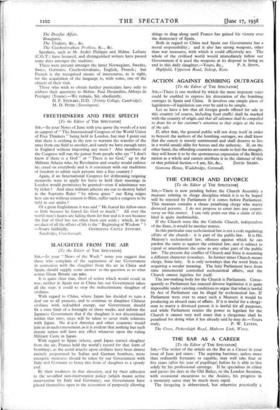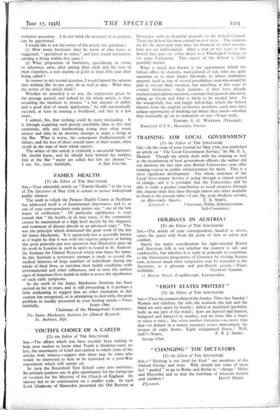THE BAR AS A CAREER
. [To the Editor of. THE SPECTATOR]
SIR,—The writer of the article on the Bar as a Career in your issue of June 3rd states : The aspiring barrister, unless more than ordinarily fortunate or capable, may well take four or five years (after his year of pupillage) before he is able to live solely by his professional earnings. If he specialises in crime and passes his days at the Old Bailey, or the London. Sessions, with occasional excursions to, the Assizes, his progress in a monetary sense may be much more rapid.
The foregoing is abbreviated, but otherwise practically g
verbatim quotation. I do not think the accuracy of its purport can be questioned.
I would like to ask the writer of the article two questions : (t) How many barristers does he know of who have, as suggested, " specialised in crime," and have found themselves earning a living within five years ?
(2) What prbtortion of banisters, specialising in crime or otherwise, earn, after paying their clerk and the rent of their chambers, a nett income of £200 in their fifth year after being called ?
In answer to my second question, I would hazard the opinion that nothing like 5o per cent. do as well as that. What does the writer of the article think ?
Whether he intended it or not, the impression given by the passage quoted, and indeed by the whole article, is that, assuming the barrister to possess " a fair amount of ability and a good deal of steady application," he will automatically succeed, at least in earning a livelihood, and that in a few years.
I submit, Sir, that nothing could be more misleading. It is through acquiring such grossly unreliable ideas as this that optimistic, able and hardworking young men often waste money and time in an abortive attempt to make a living at the Bar. What is worse, the consequent disillusionment of failure, and the loss of those crucial years of their youth, often result in the ruin of their whole careers.
The writer of this article is evidently a successful barrister. He should know, and he should have warned his readers, that at the Bar " many are called but few are chosen."—



















































 Previous page
Previous page